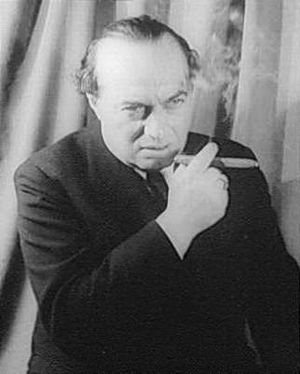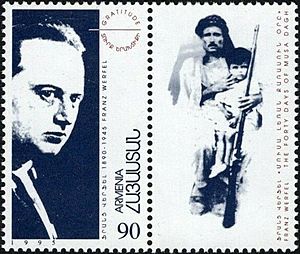Franz Werfel facts for kids
Quick facts for kids
Franz Werfel
|
|
|---|---|

Werfel photographed by Van Vechten, 1940
|
|
| Born |
Franz Viktor Werfel
10 September 1890 |
| Died | 26 August 1945 (aged 54) |
| Occupation | Novelist, playwright, poet |
| Spouse(s) | |
| Relatives | Hanna Fuchs-Robettin (sister) |
| Signature | |
 |
|
Franz Viktor Werfel (10 September 1890 – 26 August 1945) was an Austrian writer. He wrote many novels, plays, and poems. His career happened during important times like World War I and World War II.
Werfel is best known for two famous books. One is The Forty Days of Musa Dagh (1933). This novel tells a story based on the Armenian genocide of 1915. His other well-known book is The Song of Bernadette (1941). This novel is about the life of a French Catholic saint named Bernadette Soubirous. It was even made into a Hollywood movie.
Contents
Early Life
Franz Werfel was born in Prague on September 10, 1890. At that time, Prague was part of the Austro-Hungarian Empire. His family was Jewish.
When he was a child, a Czech Catholic governess named Barbara Šimůnková helped raise him. She often took him to mass at the main cathedral in Prague. Werfel also went to a Catholic school run by the Piarists. This school allowed a rabbi to teach Jewish students for their Bar Mitzvahs.
Because of these experiences, Werfel became very interested in Catholicism. He also learned about other faiths like Theosophy and Islam. This interest in different religions often appeared in his stories and writings.
Career as a Writer
Werfel started writing when he was young. In 1911, he published his first book of poems called Der Weltfreund. This title means "the friend to the world."
Around this time, Werfel became friends with other German Jewish writers in Prague. These friends included Max Brod and Franz Kafka. Famous critics like Karl Kraus praised Werfel's early poems.
In 1912, Werfel moved to Leipzig, Germany. He worked as an editor for a new publishing company. He helped publish the first poetry book by Georg Trakl. While in Germany, Werfel met many other important writers and thinkers of the early 1900s.
World War I and New Ideas
When World War I began, Werfel served in the Austro-Hungarian Army. He worked as a telephone operator on the Russian front. This experience showed him the difficulties of total war. It also gave him time to keep writing.
During the war, he wrote many Expressionist poems and plays. His writing combined ideas of humanism (focusing on human values) and personal feelings. He also included parts of his own life, mythology, and religion. His works explored topics from ancient Egypt to different faiths.
Werfel's focus on Christian subjects sometimes made some of his Jewish friends and readers feel distant. However, others, like Martin Buber, continued to support him.
Life in Vienna and Marriage
In 1917, Werfel moved to Vienna. He worked for the Military Press Bureau. There, he met other famous Austrian writers.
Through one of these writers, Werfel met Alma Mahler. She was a composer and a well-known figure in Vienna. Werfel and Alma fell in love and later married on July 6, 1929. Alma was very supportive of Werfel's writing. She helped him become a successful novelist and playwright, not just a poet.
Famous Novels and Escaping the Nazis
In 1924, Werfel published Verdi – Roman der Oper (Novel of the Opera). This book made him famous as a novelist. He also won awards for his writing. In 1926, his play Juarez and Maximilian was performed in Berlin. It was about a struggle in 1860s Mexico.
In 1930, Werfel and Alma traveled to Palestine. There, he met Armenian refugees in Jerusalem. This experience inspired his novel The Forty Days of Musa Dagh. This book brought worldwide attention to the Armenian genocide. Werfel gave talks about this topic in Germany.
However, the Nazi party did not like his book. They called him a propagandist. In 1933, Werfel was forced to leave the Prussian Academy of Arts. The Nazis also burned his books.
After Austria was taken over by Germany in 1938 (an event called the Anschluss), Werfel had to leave Austria. He went to France. When Germany invaded France during World War II, Werfel had to flee again. He and Alma narrowly escaped the Nazi regime with help from people like Varian Fry.
They found shelter for five weeks in Lourdes, a pilgrimage town in France. Catholic groups there helped them a lot. Werfel promised to write about this experience. After reaching the United States safely, he published The Song of Bernadette in 1941.
Werfel and his family traveled through the Pyrenees mountains on foot to Spain, then to Portugal. From there, they sailed to New York City, arriving in October 1940.
Life in America
Werfel and his family settled in Los Angeles, California. They met other German and Austrian writers and artists who had also moved there.
In California, Werfel wrote his last play, Jacobowsky and the Colonel. This play was later made into a film called Me and the Colonel in 1958. Before he died, he finished the first draft of his last novel, Star of the Unborn. This book was published after his death in 1946.
Death
Franz Werfel died from heart failure in Los Angeles in 1945. He was first buried in Rosedale Cemetery there. However, in 1975, his body was moved back to Vienna, Austria. He was reburied in the Zentralfriedhof, a large cemetery in Vienna.
Honours and Awards
- 1926 Grillparzer Prize
- 1927 Czechoslovak State Award
- 1930 Schiller Prize
- 1937 Austrian Cross of Honour for Science and Art, 1st class
- 1949 A street in Vienna was named Werfelstrasse.
- 1975 He received a Grave of honor (German: Ehrengrab) in the Zentralfriedhof in Vienna.
- 1990 Austria issued a stamp for Franz Werfel.
- 1995 Germany issued a stamp for the 50th anniversary of his death.
- 1995 Armenia issued a stamp featuring Franz Werfel and a hero from his novel The Forty Days of Musa Dagh.
- 2000 A monument to him was placed in Schillerplatz in Vienna.
- 2006 He was given honorary Armenian citizenship after his death.
Filmography
Many of Franz Werfel's works have been made into movies and TV films:
- Juarez (1939), based on his play Juarez and Maximilian.
- The Song of Bernadette (1943), based on his novel.
- Me and the Colonel (1958), based on his play Jacobowsky and the Colonel.
- Embezzled Heaven (West Germany, 1958), based on his novel.
- Die wahre Geschichte vom geschändeten und wiederhergestellten Kreuz (West Germany, 1963, TV film), based on his story.
- Jacobowsky and the Colonel (West Germany, 1967, TV film), based on his play.
- The Man Who Conquered Death (West Germany/Austria, 1974, TV film), based on his story.
- Class Reunion (West Germany, 1974, TV film), based on his novel.
- Cella oder Die Überwinder (West Germany/Austria, 1978, TV film), based on his unfinished novel.
- Die arge Legende vom gerissenen Galgenstrick (East Germany, 1978, TV film), based on his story.
- The Forty Days of Musa Dagh (1982), based on his novel.
- Eine blassblaue Frauenschrift (Austria, 1984, TV film), based on his story.
- Jacobowsky and the Colonel (Czechoslovakia, 1987, TV film), based on his play.
- Embezzled Heaven (Germany, 1990, TV film), based on his novel.
- Class Reunion (Czech Republic, 2000, TV film), based on his novel.
Images for kids
See also
 In Spanish: Franz Werfel para niños
In Spanish: Franz Werfel para niños
- Witnesses and testimonies of the Armenian genocide
- Exilliteratur
- Franz Werfel Human Rights Award
 | Ernest Everett Just |
 | Mary Jackson |
 | Emmett Chappelle |
 | Marie Maynard Daly |




